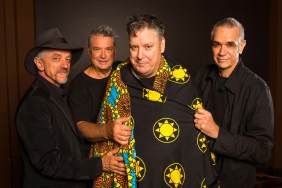Hipster metal. Poser metal. False metal. Pitchfork metal. Heavy metal is a wide, wide spectrum that has come to incorporate elements of countless of other styles and sounds. These, however, are not sub-genres – these are the tags and taunts that follow around Deafheaven like a bad smell.
Not that the band will ever let their detractors get to them, of course. Although they originally formed in 2010, following the demise of grindcore band Rise of Caligula, it was in 2013 with the release of their second LP, Sunbather, that the band exploded onto a global scale.
The album – a sprawling, hazy masterwork combining a precision assault of black metal and an overlying influence of shoegaze and post-rock – has gone on to garner cult-classic status. They might only play to hundreds of people rather than thousands, but those in attendance give over everything to Deafheaven’s music. It’s a full, exhausting emotional investment.
This, naturally, has continued on to New Bermuda, the band’s third album overall and their first with noted alternative label ANTI-, home to acts as diverse as Tom Waits, Title Fight, Billy Bragg and Sage Francis.
It’s been met with similar rave reviews – as well as the same heavier-than-thou purists trying to muck-rake the band out of existence. With its release still fresh, we spoke with lead vocalist and lyricist George Clarke about life at the front of metal’s most divisive band.
Watch: Deafheaven New Bermuda Trailer
Music Feeds: Before we even get into the nuts and bolts of New Bermuda, let’s quickly talk about the artwork for the record. It’s an absolutely stunning oil painting, but it’s also a far cry from the bright pinks and orange haze of the Sunbather cover. Was that at all a subtle dig at those pointing to the Sunbather art as evidence that you weren’t a “real” metal band? Perhaps noting that you were able to do something darker as well on that front?
George Clarke: [laughs] Not really. It really wasn’t! A lot of people have hinted that New Bermuda as a whole is supposed to be like an answer to our critics… that’s just not the case. The reason we went with this artwork because we wrote a record that was darker, that dealt with depression.
It has a lot of intertwined ugliness and beauty. I wanted something to reflect that. The only thing that I knew had to be intentionally, specifically different to Sunbather was the cover – I didn’t want to do a graphic cover again. From the start, I wanted to have the cover be a painting. That painting fit the mood of the record the same way I felt the cover of Sunbather fit the mood. It’s just the way things turned out.
MF: The response to Sunbather was unbelievable – it might be the first metal record of the decade to properly break out and have followings in other circles other than the immediate metal scene. Indie rock kids love that record. Hardcore kids love that record. Having been exposed to such a wide audience, did that affect how the record was written or made?
GC: I think we honestly just wanted to make something that was different to what we’d done previously. There’s parts of our style that will always be a part of what we do – we’re always going to sound like we sound to a certain degree. We didn’t want to write a Sunbather II.
We didn’t even want to write a [debut album, 2011’s] Roads to Judah II. What we wanted to do was utilise different influences in ways that benefited the band. The whole process felt very natural.
MF: New Bermuda is a shorter record than Sunbather, too – something like 15 minutes shorter – and is comprised of only five songs. Did you settle onto the core five early on? Did it feel like adding or subtracting from that set would have messed things up?
GC: Once the record was complete, we knew it was complete. Because there were so many interludes on Sunbather, we argued that this record has a lot more content song-for-song. There’s just less space in-between.
There’s a lot going on in each song – they’re very dense, and there’s a lot of texture to the songs. Sunbather might be a longer record, but I think the weight of this record matches up to it in that regard. They complement one another quite well.
Listen: Deafheaven – Brought To The Water
MF: You’ve mentioned the darkness of New Bermuda. Where did that stem from for your own lyric writing for this album? Was it more about telling stories or about drawing from personal experience?
GC: I just wanted to talk about things that I had been going through – my feelings toward the world. As great as last year was for me, and as many highs that the band had, I also had a lot of personal lows. Deafheaven typically writes about the lows of life – it set the scene for what New Bermuda would be.
MF: One thing that has crept up in discussions about New Bermuda is the lyrical side of things – which is interesting, given that your vocal style can often make the lyrics indecipherable to an untrained ear. Is it important to make sure what you’re writing about is introspective and honest – especially considering your band traverses in a genre that can often be lost in translation?
GC: I think it is important. I think it’s very important. In terms of the weight of our lyrics… I’ve always found that if people enjoy the songs first and are willing to investigate the lyrics, they would only benefit from it. They would only have a deeper understanding of the record.
It’s the second layer of the whole thing – you listen first, and then you invest in it further. You find out what’s going on behind each song. It becomes a full experience. I guess it’s not something that’s always practiced in extreme metal, but it’s a huge part of this band and what we do.
MF: For everyone that has come to love Deafheaven over the last few years, it’s also brought on your fair share of detractors – particularly within the metal community who feel compelled to let the universe know that what Deafheaven is doing isn’t “real” metal or “true” metal. It was particularly prevalent around the release of Sunbather – do you feel as though that has changed at all following the release of New Bermuda?
GC: I mean, it’s always something that is going to follow the band around. It’s always going to be the main criticism around our band. It doesn’t matter what kind of record we put out – there’s always going to be someone saying that about our music. Having said that… does it get to me? Absolutely not. I couldn’t care less.
It’s been following this band around for five years now, and it hasn’t slowed us down at all. In the grand scheme of things, it’s probably one of the better ones to have. It could definitely be worse – we could be told flat-out that our songs are bad. I think that would hurt way more than being told that we’re not a “real” metal band.
I mean, it doesn’t even really have anything to do with our music – it’s more people’s own personal hang-ups about the way that we present ourselves. It’s a matter of authenticity – if we’re never going to be that to a sub-sect of people, so be it.
MF: Exactly right. At the end of the day, it’s music – and music is allowed to be fluid and shifting. It actually turns out to be a lot more interesting if that’s what it’s doing. There’s moments on New Bermuda that – and it’s meant in the best way possible – are the least metal things that Deafheaven has ever done.
There’s acoustic guitar, piano, percussion… not to bring it back to the first line of questioning around answering your critics, but was that side of New Bermuda’s composition a statement of sorts to demonstrate that you’re not trying to be the most extreme or the most brutal kind of metal band?
GC: Not really. For us, we were just building up a song the way that we normally do. We had a riff, we worked through its progression and then Kerry [McCoy, guitarist] had the idea for a piano part. We never thought about being un-metal or making a statement – it just fit the outro and it sounded really cool.
There’s one thing people should know about Deafheaven – our music is not reactionary. It’s not written with anyone in mind or for anyone in mind. It’s for us. It’s for anyone that wants to listen to it. You don’t need any qualifiers or any traits to listen to our music. We just write songs that we find interesting – if people like it, that’s great. If they don’t understand it, that’s really not our problem.
–
‘New Bermuda’ is out now, you can grab a copy of it here.
Listen: Deafheaven – Come Back












